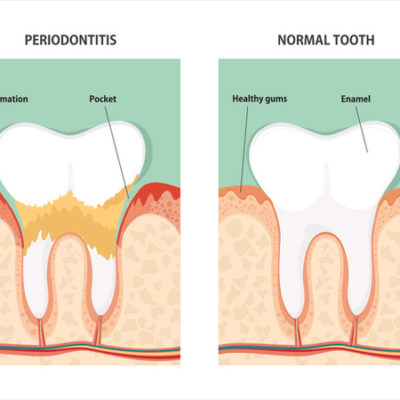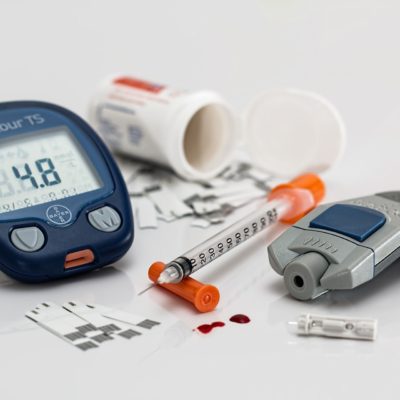Scientists have long sought to find out how some diseases can have symptoms restricted to just one tissue when they are caused by a single faulty protein found throughout the body. Familial Partial Lipodystrophy type 2 (FPLD2) is a rare disorder causing diabetes, loss of fat in the arms and legs and over development of muscles, yet the faulty protein, lamin A, is found in … [Read more...]
Diabetes News

People With High-Risk Prediabetes Benefit From Intensive lifestyle Intervention
Intensive lifestyle intervention with plenty of exercise helps people with prediabetes improve their blood glucose levels over a period of years and thus delay or even prevent type 2 diabetes. In particular, individuals with prediabetes at highest risk benefited from intensive lifestyle intervention. This is shown by the evaluation of the Prediabetes Lifestyle Intervention … [Read more...]
New Biomarkers may Detect Early Eye Changes that can lead to Diabetes-Related Blindness
New biomarkers found in the eyes could unlock the key to helping manage diabetic retinopathy, and perhaps even diabetes, according to new research conducted at the Indiana University School of Optometry. During its early stages, diabetes can affect the eyes before the changes are detectable with a regular clinical examination. However, new retinal research has found that … [Read more...]
New Study Reveals that Children of Mothers with Diabetes During Pregnancy have an Increased Risk of Eye Problems
A new study published in Diabetologia (the journal of the European Association for the Study of Diabetes [EASD]) finds that mothers who have diabetes before or during their pregnancy are more likely to have children who go on to develop eye problems. The research is by Dr Jiangbo Du, State Key Laboratory of Reproductive Medicine, Nanjing Medical University, Nanjing, China, … [Read more...]
Babies at Risk for Diabetes may have Microbiota Restored
Newborns at risk for Type 1 diabetes because they were given antibiotics may have their gut microorganisms restored with a maternal fecal transplant, according to a Rutgers study. The study, which involved genetic analysis of mice, appears in the journal Cell Host & Microbe. The findings suggest that newborns at risk for Type 1 diabetes because their microbiome -- the … [Read more...]
A Promising New Pathway to Treating Type 2 Diabetes
A promising new pathway to treating type 2 diabetes ++diabetes This year marks the 100th anniversary of the discovery of insulin, a scientific breakthrough that transformed Type 1 diabetes, once known as juvenile diabetes or insulin-dependent diabetes, from a terminal disease into a manageable condition. Today, Type 2 diabetes is 24 times more prevalent than Type 1. The … [Read more...]
‘Prescription’ to Sit Less, Move more Advised for Mildly High Blood Pressure and Cholesterol
A "prescription" to sit less and move more is the optimal first treatment choice for reducing mild to moderately elevated blood pressure and blood cholesterol in otherwise healthy adults, according to the new American Heart Association scientific statement published today in the American Heart Association's journal Hypertension. "The current American Heart Association … [Read more...]
Research Advances One Step Closer to Stem Cell Therapy for Type 1 Diabetes
Type 1 diabetes, which arises when the pancreas doesn't create enough insulin to control levels of glucose in the blood, is a disease that currently has no cure and is difficult for most patients to manage. Scientists at the Salk Institute are developing a promising approach for treating it: using stem cells to create insulin-producing cells (called beta cells) that could … [Read more...]
Muscle Gene Linked to Type 2 Diabetes
People with type 2 diabetes tend to have poorer muscle function than others. Now a research team at Lund University in Sweden has discovered that in type 2 diabetes, a specific gene is of great importance for the ability of muscle stem cells to create new mature muscle cells. The findings are published in Nature Communications. "In people with type 2 diabetes, the VPS39 gene … [Read more...]
Swapping alpha cells for beta cells to treat diabetes
Blocking cell receptors for glucagon, the counter-hormone to insulin, cured mouse models of diabetes by converting glucagon-producing cells into insulin producers instead, a team led by UT Southwestern reports in a new study. The findings, published online in PNAS, could offer a new way to treat both Type 1 and Type 2 diabetes in people. More than 34 million Americans have … [Read more...]
Dental experts discover biological imbalance is the link between gum and kidney disease
An imbalance of the body's oxygen producing free radicals and its antioxidant cells could be the reason why gum disease and chronic kidney disease affect each other, a new study led by the University of Birmingham has found. Periodontitis -- or gum disease -- is a common, inflammatory disease which causes bleeding gums, wobbly or drifting teeth and can eventually result in … [Read more...]
Routine eye scans may give clues to cognitive decline in diabetes
As they age, people with diabetes are more likely to develop Alzheimer's disease and other cognitive disorders. Scientists at Joslin Diabetes Center now have shown that routine eye imaging can identify changes in the retina that may be associated with cognitive disorders in older people with type 1 diabetes. These results may open up a relatively easy method for early … [Read more...]
Researchers Urge Priority Vaccination for Individuals with Diabetes
Vanderbilt University Medical Center researchers have discovered individuals with type 1 and type 2 diabetes infected with COVID-19 are three times more likely to have a severe illness or require hospitalization compared with people without diabetes. Because of this amplified impact, they are urging policymakers to prioritize these individuals for COVID-19 vaccination. … [Read more...]
Study Connects Diabetes, Air Pollution to Interstitial Lung Disease
People with pre-diabetes or diabetes who live in ozone-polluted areas may have an increased risk for an irreversible disease with a high mortality rate. A new study published in the Environmental Health Perspectives connects insulin resistance and repetitive ozone exposure to the development of interstitial lung disease. "Our findings are especially important today as … [Read more...]
Molecular Processes in Kidney Cells discovered that attract and feed COVID-19
Although the lungs are a common target for COVID-19's cytokine storm, so are the kidneys, making the 1 in 4 U.S. adults with diabetes resulting in diabetic kidney disease at increased risk for virus mortality. Why are the kidneys so attractive to the coronavirus? Recently published in Kidney International, a national research team made up of kidney clinicians, … [Read more...]
How changing the stem cell response to inflammation may reverse periodontal disease
Periodontal disease, also known as gum disease, is a serious infection that affects nearly 50 percent of Americans aged 30 years and older. If left unchecked, periodontal disease can destroy the jawbone and lead to tooth loss. The disease is also associated with higher risk of diabetes and cardiovascular disease. The current treatment for periodontal disease involves … [Read more...]
Urine Test Reveals Quality of Your Diet — and Whether it’s the Best Fit for Your Body
Scientists have completed large-scale tests on a new type of five-minute urine test that measures the health of a person's diet, and produces an individual's unique urine 'fingerprint'. Scientists at Imperial College London in collaboration with colleagues at Northwestern University, University of Illinois, and Murdoch University, analysed levels of 46 different so-called … [Read more...]
Obesity is a critical risk factor for type 2 diabetes, regardless of genetics
Obesity increases the risk of developing type 2 diabetes by at least 6 times, regardless of genetic predisposition to the disease, concludes research published in Diabetologia (the journal of the European Association for the Study of Diabetes [EASD]). The study is by Dr Theresia Schnurr and Hermina Jakupovi?, Novo Nordisk Foundation Center for Basic Metabolic Research, Faculty … [Read more...]
A non-invasive way of monitoring diabetes
Saliva could be used instead of blood to monitor diabetes in a method proposed in research involving the University of Strathclyde. The test has been developed as an alternative to the current prevalent practice of monitoring blood glucose, which can be invasive, painful and costly. Lab tests of the saliva process had an accuracy rate of 95.2%. The research shows … [Read more...]
How enzymes build ‘sugar trees’
Many of the membrane proteins in eukaryotic cells are decorated with complex sugar trees called glycans. In addition to being extremely diverse, these sugar trees serve as a way to identify the respective organism, a cell type or its stage of maturity. For instance, the various blood groups in humans feature different glycans. Complex sugars that are attached to … [Read more...]
Avocados may help manage obesity, prevent diabetes
Your guacamole may hold the key to managing obesity and helping delay or prevent diabetes, according to a new study by a University of Guelph research team. For the first time, researchers led by Prof. Paul Spagnuolo have shown how a compound found only in avocados can inhibit cellular processes that normally lead to diabetes. In safety testing in humans, the team also … [Read more...]
Type 2 diabetes remission possible with ‘achievable’ weight loss
The findings suggest that it is possible to recover from the disease without intensive lifestyle interventions or extreme calorie restrictions. Type 2 diabetes affects 400 million people worldwide and increases the risk of heart disease, stroke, blindness and amputations. While the disease can be managed through a combination of positive lifestyle changes and medication, it … [Read more...]
Fatty fish without environmental pollutants protect against type 2 diabetes
Research on the effect of fish consumption on diabetes risk has produced contradictory results in recent years. Some studies show that eating a lot of fish reduces the risk of developing type 2 diabetes, while others show it has no effect, and some studies show it even tends to increase the risk. Researchers at Chalmers University of Technology conducted a study with an … [Read more...]
Breastfeeding reduces child obesity risk by up to 25%, WHO
Breastfeeding can cut the chances of a child becoming obese by up to 25%, according to a major study involving 16 countries. World Health Organisation (WHO) experts who led the Europe-wide research are calling for more help and encouragement to women to breastfeed, as well as curbs on the marketing of formula milk which, said senior author Dr João Breda, misled women into … [Read more...]
Drug reduces risk of kidney failure in people with diabetes
A new landmark clinical trial shows that a drug lowers the risk of kidney failure by a third in people with Type 2 diabetes and kidney disease. "For the first time in 18 years, we have a therapy for patients with Type 2 diabetes and chronic kidney disease that decreases kidney failure," said Kenneth Mahaffey, MD, professor of medicine at the Stanford University School of … [Read more...]
Alcohol intake may be key to long-term weight loss for people with Diabetes
Research shows that losing weight can help prevent or delay the onset of diabetes. While best practice for weight loss often includes decreasing or eliminating calories from alcohol, few studies examine whether people who undergo weight loss treatment report changes in alcohol intake and whether alcohol influences their weight loss. A new study from the University of … [Read more...]
Blood Test in Early Pregnancy May Predict Mom’s Diabetes Risk
A blood test seems to detect signs of gestational diabetes as early as the 10th week of pregnancy, a new U.S. government study says. Gestational diabetes occurs only in pregnancy and can pose a serious health threat to mothers and babies. It increases the mother's risk of pregnancy-related high blood pressure disorders, cesarean delivery, as well as heart disease and … [Read more...]
Diabetes during pregnancy may increase baby’s heart disease risk
Gestational diabetes may increase the risk of blood vessel dysfunction and heart disease in offspring by altering a smooth muscle protein responsible for blood vessel network formation. Understanding of the protein's function in fetal cells may improve early detection of disease in children. Gestational diabetes, a state of prolonged high blood sugar during pregnancy, … [Read more...]
Clinical trial examines impact of high-dose omega-3 and vitamin D on halting type 1 diabetes
Scientists from the Diabetes Research Institute (DRI) at the University of Miami Miller School of Medicine today announced the launch of a new clinical trial that will assess the impact of high-dose omega-3 fatty acids and vitamin D supplementation on halting the progression of type 1 diabetes (T1D). The DRI has received FDA IND clearance to proceed with the Phase I/IIa trial, … [Read more...]
Lentils significantly reduce blood glucose levels
Replacing potatoes or rice with pulses can lower your blood glucose levels by more than 20 per cent, according to a first-ever University of Guelph study. Prof. Alison Duncan, Department of Human Health and Nutritional Sciences, and Dan Ramdath of Agriculture and Agri-Food Canada, found that swapping out half of a portion of these starchy side dishes for lentils can … [Read more...]
- « Previous Page
- 1
- 2
- 3
- 4
- …
- 24
- Next Page »


































